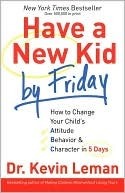More on this book
Community
Kindle Notes & Highlights
by
Kevin Leman
Read between
November 16 - November 25, 2020
“I feel hurt by life, so I have a right to strike out at others, including you.” If your child is at this level, you really need this book. Many children who proceed to the revenge stage are headed toward the beginning of a rap sheet.
When you choose to do battle with your children, you’ll never win. You have much more to lose than they do.
You’ll never win in a power struggle, so don’t go there.
If you want your child to take you seriously, say your words once. Only once. If you say it more than once, you’re implying, “I think you’re so stupid that you’re not going to get it the first time, so let me tell you again.”
Critics will say, “But won’t you make your child feel bad and guilty?” I hope so!
many parents today want to be their child’s friend. But this never works in the long run.
Let him figure out, sooner or later, that your new, consistent behavior has something to do with the big chip of attitude he’s carrying on his shoulder.
Your attitude can’t help but slip out through your behavior, and children are always watching.
My personal view is that you should never promise your children anything. Promising them is saying that (1) your car will never break down, (2) every day will go exactly as you’ve planned it, (3) you are perfect, and (4) it won’t rain.
Why do they misbehave around you? Because you expect them to, and the only way they can get attention from you is by misbehaving!
Learn to respond rather than react.
It comes down to this: seeing the changes you want implemented is more about you than it is about your child. It’s more about you changing your Attitude, Behavior, and Character than him changing his Attitude, Behavior, and Character.
But here’s the important thing to remember: what your children think about you at any one particular moment isn’t necessarily what they will think about you for life.
parents need to address their own behavior before they expect their children to change.
You know the biggest secret of all: your child wants to please you.
Your child is a lot more helpless than he seems. That’s why the method of “B doesn’t happen until A is completed” works so well.
Say through your actions, “We’re a family. We belong together.”
When you allow your children to be competent, they will be competent.
Children who have been allowed to have their own way for a while can be extremely powerful.
As your child grows more powerful, his contempt for you will grow. After all, if he can control you, why respect you? You’re not the authority figure any longer.
Too many parents pay psychiatrists to prescribe a label and then medicate their child when all the child needs is her parents’ time and attention.
So being angry in itself isn’t right or wrong; it’s how the anger is handled that is right or wrong.
It’s better to force a blowout than to suffer through the slow leak.
If your child makes a comment you think is shocking or ridiculous, instead of saying, “That’s the stupidest thing I ever heard,” which is probably your first inclination, instead say, “That’s interesting. Tell me more about that.”
But guess what? Parenting is an inconvenience.
People today love disorders and labels.
Frankly, labeling your child gets him off the hook for his behavior, and it also gives you a convenient excuse for the way your child acts, so you don’t have to do anything about it other than agree to medicate your child: “She’s not doing well at school because she’s ADD, and the teachers don’t understand her.” Or, “He can’t help it. It’s just the way he is.”
I’m convinced that what children need is not labels but one-on-one attention from Mom and Dad.
If there’s something about your child you don’t like, they’ve probably seen it in action from you and are simply modeling it.
Often we do too much thinking for our kids. We do too many things for them. We’re too good as parents. We try to protect them from themselves. But sometimes they need to experience the consequences of their decisions. They need to lose out on something they wanted to do.
Sometimes we parents are dumber than mud.
If you’re worried that your child will look like a failure, then your thinking is all about you (you’re afraid of what your friends will say about your child and your failure in child-rearing) and not in your child’s best interest.
When it comes to the safety of your child, there are no privacy rights. If there is something going on, you are responsible to find out. You’re the parent.


